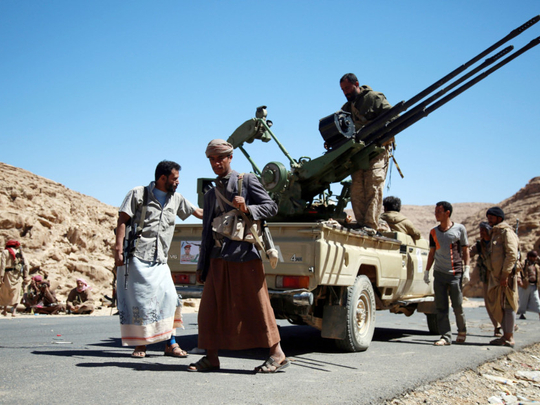
Sana’a: As tribal mediation brings calm to the Saudi-Yemen border following a nearly year-long intervention led by Riyadh against Iran-backed Al Houthi militants, Washington has welcomed talk of an end to the coalition’s major combat.
“We have expressed our concerns about the loss of innocent life in Yemen. The violence there that is plaguing that country has caught too many innocent civilians in the crossfire,” White House spokesman Josh Earnest said on Thursday.
He said “we would welcome and do welcome” a statement from the coalition spokesman, Brigadier General Ahmad Al Assiri, who told AFP in an exclusive interview that the coalition is “in the end of the major combat phase”.
This would be followed by security stabilisation and then reconstruction, he said.
The coalition intervened on March 26 last year to support Yemen’s legitimate president Abd Rabbo Mansour Hadi after militants seized large parts of Yemen including the capital Sana’a.
Supported by coalition air strikes and some ground troops, anti-Al Houthi forces have retaken territory, including much of the south.
Mustafa Alani, of the independent Gulf Research Centre, said that although fighting is not necessarily going to finish by March 26 “the operation is basically reaching its end.”
He said the coalition is keen “not to go beyond that psychological date.”
Al Houthis launched cross-border attacks against Saudi Arabia in retaliation for the intervention, with more than 90 people - both military and civilian - killed on the Saudi side of the frontier by shelling and in skirmishes.
Al Assiri said the border was essentially calm since a mediation effort by tribal leaders last week allowed aid to start moving into Yemen, including to Al Houthi-held areas, at the Alb crossing in Dhahran Al Janoub, northeast of Jazan city.
Alani, the analyst, said the Saudis hope the same model could work for “the city war”, where Yemeni forces are making progress, albeit slowly.
On a third front, the coalition is fighting Al Qaida militants who have taken advantage of Yemen’s conflict to gain ground in the country’s south.
“The Saudis hit a number of targets in Al Mukalla and in the south,” Alani said.
“This war is an unspoken war but it is going on.”
On Thursday, Al Qaida fighters shot dead three people accused of witchcraft in a public execution in Hadramout, said an official in the southeastern province, whose capital is Al Mukalla.












